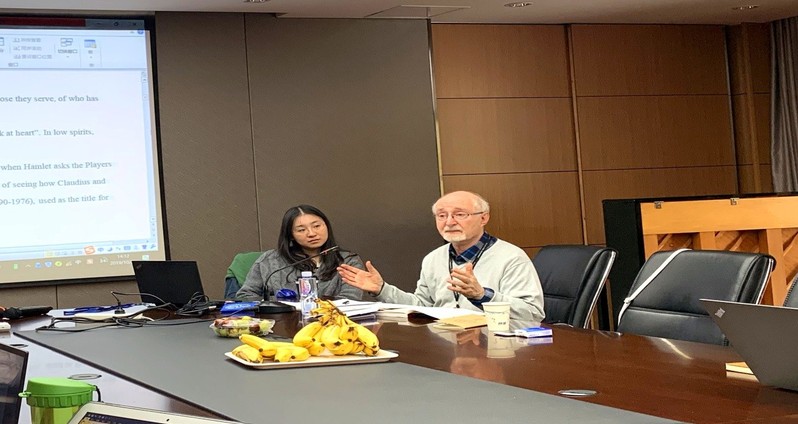In the afternoon of October 28, 2019, William Baker, a senior professor at Northern Illinois University, visited the School of International Studies (SIS), Zhejiang University at the invitation of the Center for Medieval and Renaissance Studies (CMRS) of SIS, and delivered a lecture themed “Shakespeare’s Openings: Their Significance”. As an international consultant to the CMRS and a visiting professor of Zhejiang University, Professor Baker has published over 30 books and more than 100 papers. He has recently participated in the “International Symposium on Studies of Medieval and Early Modern European Literature” as the keynote speaker. Hosted by Professor Hao Tianhu, the lecture was attended by students and teachers at SIS and dozens of visiting scholars from other universities.

At the beginning, Prof. Baker showed the opening of the film Hamlet, inspiring the audience to think about the features of the openings in Shakespeare’s plays. He pointed out that due to different venues and audience, the openings always adopted a unique way to attract audience. In different places like the Global Theatre where audience talk loud, the Thames with bear fighting noises, and theaters where men and women talk and laugh, Shakespeare needs to use questions and small characters as openings to help audience calm down and concentrate to wait for protagonists, while audiences in Inns of Court, who are highly educated talents, don’t need eye-catching openings. The openings with belated protagonists run through all Shakespeare’s plays.

Then, Professor Baker took Shakespeare’s two tragedies Hamlet, King Lear, comedy Twelfth Night, legendary play The Tempest, and problem play Measure for Measure as examples, with a focus on the analysis of the opening of Hamlet. Hamlet begins with a question “Who’s there?”, which reflects the confusion and ambiguity of the play; while the second sentence “unfold yourself” calls for the clarity of the characters in second-person point of view; the soldiers' cipher “Long Live the King” represents the finishing touch to understand the whole play. Professor Hao added that this sentence was quite ironic, because the old king was not immortal, but lost his life due to a plot of others; the first two scenes of the play, shifting from the soldiers’ cold and silent station to the bustling and ornate court, highlighted the political vortex centering on power with strong contrast; and Hamlet’s first sentence “A little more than King and less than kind” was even more contradictory.
Professor Baker also introduced the openings of other Shakespeare plays. For example, in the first scene of King Lear “division” and “fairness” have made the theme of the play clear; the opening of Twelfth Night “If music be the food of love, play on” begins with a hypothesis to indicate uncertainty; the name of the elf in The Tempest is impressive; the first sentence “O for a Muse of fire” in Henry V summons inspiration for literary creation and so on. In the end, Professor Baker gave a list of references and academic resources to the audience, and had lively discussions and exchanges with the students and teachers on aristocracy, death and ghosts and the contrast between Chinese and Western cultures in Shakespeare plays. Being lively, detailed, and inspiring, his lecture benefited the audience and concluded with warm applause.

Center for Medieval and Renaissance Studies
November 4, 2019
Translated by Shu Hongyi
Edited by Xu Xueying



